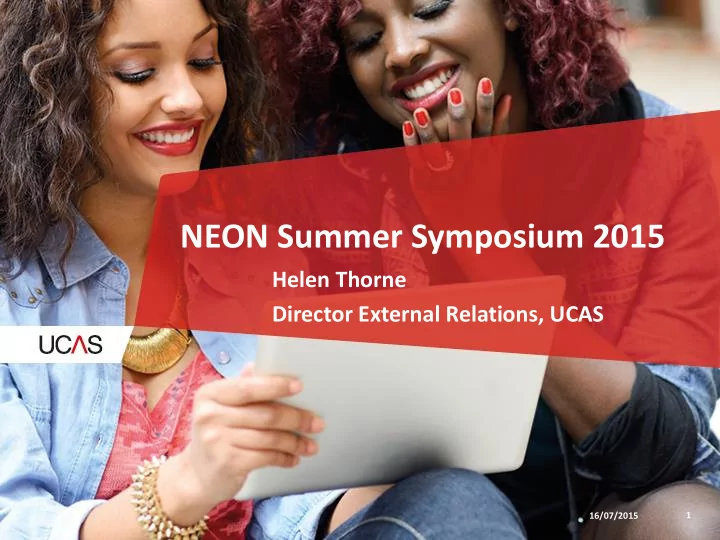

NEON Summer Symposium 2015 Helen Thorne Director External Relations, UCAS 1 16/07/2015
Summary • UCAS support for widening access & social mobility • What UCAS resources are available to help me and how to access them 2 16/07/2015
How UCAS supports widening access and social mobility 3 16/07/2015
Support for learners and advisers • Promoting the benefits of HE e.g. Love Learning Competition • Expanding information and advice on UCAS.com for post- 16 and post-18 choices • Resources for students with disabilities, older learners, care leavers • More access qualifications on the Tariff e.g. Access to HE diploma • Joining up with the National Networks of Collaborative Outreach 4 16/07/2015
Support for HE providers, access practitioners and stakeholders • Analytical reports, notes and end of cycle data covering demand, offers and acceptances by sex, age, socio- economic background, ethnicity, & progression to HE by by Tariff group • Analysis and insight for policy makers and governments • Supporting Professionalism in Admissions (SPA) • Contextual data service • STROBE – new analytical service to evaluate the effectiveness of access activities https://www.ucas.com/corporate/data-and-analysis http://www.spa.ac.uk/ 5 16/07/2015
UCAS resources for practitioners 6 16/07/2015
Our policy on personal data • We want to support understanding and advancement of access and social mobility • We also need to respect to wishes of learners using UCAS about how we share and use their personal data • Surveyed applicants in Spring 2015 - 37,000 responses • Applicants want to maintain control over their data and want UCAS to see seek explicit consent for their data to be used, even for beneficial research • New data sharing framework – autumn 2015 7 16/07/2015
Published data resources Analysis reports: - January deadline application report - End of Cycle Report Analysis notes: - Ethnic group application rates - FSM application rates - Demand by SIMD End of cycle data: - Over 850,000 data items: applications and acceptances by age, sex, qualifications, disability indicator, ethnicity, school type – much by named HEP One off reports: - How applications have changed since 2012 – for UUK panel All of the data is freely available to download as csv files 8 16/07/2015
The STROBE service • Analytical service enables evaluation of application, offer and acceptance outcomes using UCAS data • Users configure the service to meet their requirements • Outputs are aggregated and non-disclosive, so can be published and shared • Service can be used to: - understand the effectiveness of WP and outreach activity - test the success of open days - whether attending multiple WP activities makes a difference - whether outcomes vary by activity e.g. summer school v master class - measure improvements over time - Evaluate the effectiveness of treatment v control group activities
How it works • You supply us with details of the individuals you want to track (name, home postcode, dob) – with their consent • Flag which individuals belong to which reporting subgroups • List what outcomes you want to examine and in how much detail • Determine what time period you want to cover e.g. how many admissions cycles • The service can handle from tens to thousands of records
What you get • Title page: core tracking information • Charts: summary information on outcomes for each part of the admissions process • Tables: much more detailed information • Data files: supplied in .csv format to allow further processing
What it costs • UCAS runs the service at cost, not to generate a profit • Priced on a ‘per record’ basis (£2.50 per record for HE providers) Example: • User supplies 300 records • Requests matching into 2013 and 2014 cycles • Requests separate reports for parental education and free school meal eligibility • Results in 15 reports: 60 tables and 30 charts • Total cost £750
Case study: How effective is my summer school? To understand its effectiveness you want to know: • how many participants went on to apply to HE? • the proportion who applied (the application rate)? • where did they apply? • how many were made offers? • how many were accepted? • what proportion were accepted (the entry rate)? • which providers and subjects were they accepted to? • what is the contribution to WP and fair access?
How many participants applied to HE?
What was the application rate?
How many participants were accepted to HE?
What was the entry rate?
Application rate – further details
Where did they apply?
Where did they apply?
How many received offers, and from where?
To which providers were participants accepted?
Which subjects did they apply for?
Which socio-economic groups are they from?
Predicted A-Level point score
Want to know more or make a request? Seth Fleet (Principal Analyst): s.fleet@ucas.ac.uk Carl Jones (Data Scientist): c.jones@ucas.ac.uk Web pages live in September
Questions? Helen Thorne Director, External Relations 01242 544627 h.thorne@ucas.ac.uk 27
Recommend
More recommend